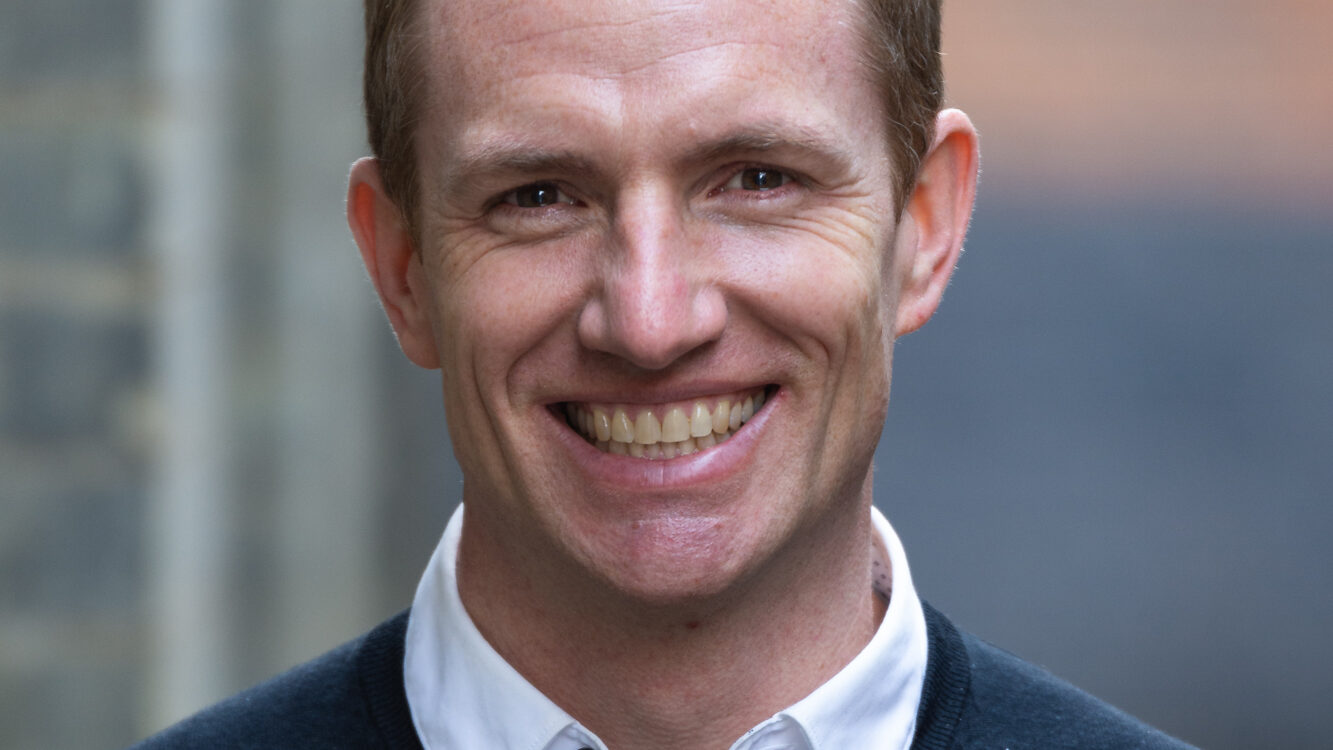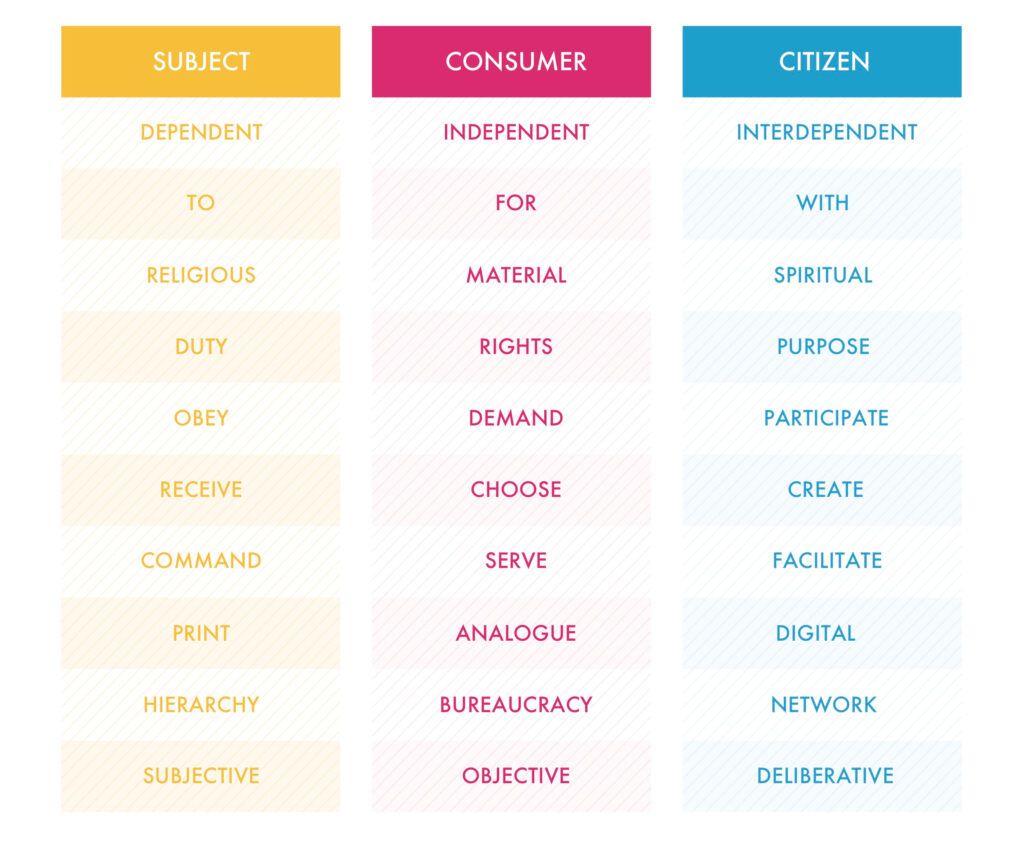‘People in positions of power need to give some of it away to citizens’
What are we doing when we tell ourselves we’re Consumers 3,000 times a day? Author and co-founder of the New Citizenship Project, Jon Alexander, chats about how we can step into a bigger idea of ourselves as citizens.

What sparked your interest in how people can be better citizens?
I started thinking about the idea of a shift from being Consumers to being Citizens while I was working in the advertising industry back in 2009.
But the flame was really lit in May 2020. It was a day we all remember: when the British government’s Covid messaging changed. It went from ‘Stay home’ to ‘Stay alert’.
In that moment, the message switched from a paternal ‘Don’t worry, the state will save us’ tone to relying on personal responsibility: ‘From this point on, if you get the virus it will be down to you. It’ll be your fault. It will be something you’ve done.’
It was a moment that drew on a long-held myth. That the greatest thing we can do – and the meaning of freedom – is to look out for number one. Everything is individual. It’s all we are: independent and isolated from one another. That’s the most we can be. I call it the Consumer Story. And I just thought: ‘Hang on. What are we building here?’
You describe in your book, Citizens, three stories across history – the Subject Story, the Consumer Story and the Citizen Story. Can you talk through each of them briefly?
The Subject Story says that the right thing for us to do is keep our heads down and do as we’re told. Because the God-given few know best. And they will lead us to the best outcomes for society as a whole. And that was the dominant story of our society for a very long time.
You have to have faith in humanity. Like what happened when Covid hit.
It collapsed around the end of the nineteenth century, and the beginning of the twentieth century, with the rise of the middle class. Particularly having gone through two World Wars. People had been in the trenches together and realised their shared humanity across race and class.
Out of that, we then shifted to a Consumer Story. Now, the right thing to do in a Consumer Story is look out for number one. To choose the best deal for yourself (from those that are offered). On the basis that individual self-interest will add up to collective interest. Because the best for society, as a whole, will emerge from the pursuit of that.
It’s Orwellian. It’s actually selfishness. But unless you name it, it’s quite hard to see.
So we went from being people who had stuff done to us to people given the freedom to choose. But just as the Subject Story fell apart, now the Consumer Story is falling apart.
What’s bubbling up instead – and could become the next dominant story of society – is the Citizen Story. Where you get involved, share your wisdom and share your ideas. You are part of a conversation about what’s best for society. As a whole.
The key premise is that all of us are smarter than any of us. So only by offering each person’s unique contribution to the whole can we possibly build the best possible outcomes for society.

If I were being cynical I’d ask: Where’s your proof for this? Can it really work? Aren’t you being rather idealistic?
There have been these risings in citizen inclination throughout history. It has always kind of bubbled. But each time it gets quashed.
Now is a moment when we can name it. So can we finally step into it? That is the challenge. It requires us to have faith in humanity. And the best recent example of this in action is what happened when Covid hit.
Our leaders didn’t react quickly because they thought we wouldn’t accept the lockdown. Because the story we live in is that we’re selfish and individualistic and freedom loving (in the terms of ‘freedom’ as offered by the Consumer Story, that is). They thought we would never accept the limitations.
But what happened? There was a surge of community feeling. I remember the first viral kindness postcard dropping through my letterbox offering help. There were street WhatsApp groups. Neighbours stood on their doorsteps and clapped for carers.
Now that really shouldn’t have happened if human nature was inherently lazy and selfish, right? If we are programmed to climb over one another, that stuff should have gone badly. The only reason it didn’t is because of who we are and the lessons of history.
Classic psychology experiments are named as evidence of our selfish nature. But even they are being ripped apart now. The Milgram experiment files have finally been unlocked. And we’ve discovered that people didn’t willingly hurt one another.
What is the biggest hurdle to making the kind of change you’re describing?
To genuinely step into the Citizen Story requires people in institutions, and positions of existing power, to open up. To give some of that power away.
My favorite story on this – that really made by hair stand on end – involves the Taiwanese government and how they’ve changed over the last decade.
There were Occupy-style protests against the rushing through of a trade bill with China. The students occupied the parliament. A hacker movement, called Gov Zero, brought in a broadband connection and started streaming the students debating the core clause of the trade bill.
The critical moment came when the Speaker of the parliament, Speaker Wang Jin-pyng, said “This is democracy. That is what this space is for.” When he did that, the whole story shifted.
I’m pretty sure Speaker Wang won’t go down in history as a hero. But the requirement of leaders to create these spaces and to acknowledge the citizenry – to set aside their hero complex – is the single greatest barrier.
We are citizens by nature. And we can create great stuff. Will we be given the oxygen, space and structures for it to become our story? That depends on those in power.
Our only agency is to choose between the options someone else offers us.
I have a favorite image from the book. You mention how having lots of choice makes us forget there might be possibilities “beyond the menu”.
Absolutely, because we live today in a consumer democracy. Well, we call it a democracy – but our only agency is to choose between the options someone else offers us. Rather than a democracy where we have meaningful voice in shaping it on an ongoing basis.
I saw an interview Krishnan Guru-Murthy did on Channel Four News. I admire him greatly. But he was speaking to someone about our leaders: how we voted for them, how we chose them. And I was thinking: Yes, but from what selection?
That’s why I love the idea of something like Engage Britain. Because you’re saying ‘Look: people have ideas, energy and resources, too.’ People have ways of thinking and working that are vital to figuring out how best to run a country.
You write about how we live in a legacy of stories created by generations before us. Can you unpack that a little?
There are two core ideas about humanity that sit at the heart of my work. First, that we are citizens by nature. And second, that we are essentially storytelling creatures.
We create stories we live in. And derive from them our ideas about what to do and how to be good. I think that’s how you can hold faith in humanity – the belief that humans are inherently creative, caring, collaborative creatures – alongside the realities of the world.
The problem is we’re deriving our ideas of how to be good from a story that was created 100 or even 150 years ago. That story is creating the crises that we’re inhabiting right now. It still tells us to focus on our own little bit and look out for ourselves.
As a result, we’re in a social crisis of division and loneliness. We’re looking for solutions from a story that says happiness is attained by accumulating. The pain of that is huge.
But I guess the flip-side is it’s only a story?
Absolutely right. And when the veil drops – the Morpheus moment in The Matrix, as I like to think of it! – the moment you see it, you see one another differently. You think differently. You believe in different possibilities. And you just start to have a whole lot more fun as well.
Citizens: Why The Key To Fixing Everything Is All Of Us by Jon Alexander and Ariane Conrad is published by Canbury Press.